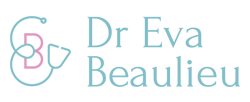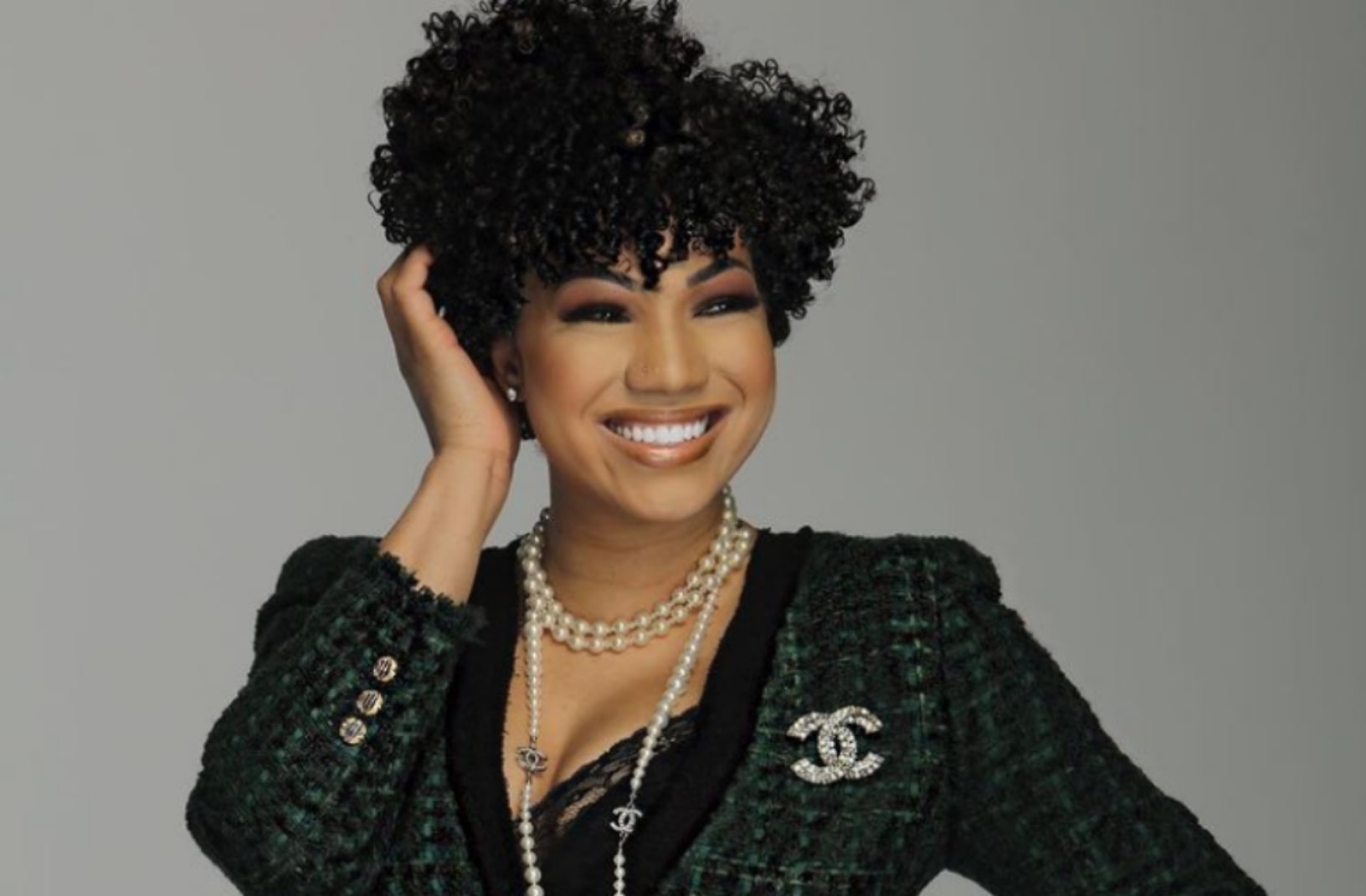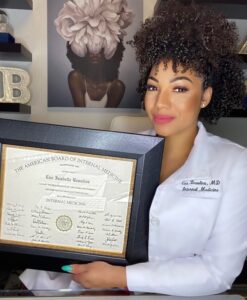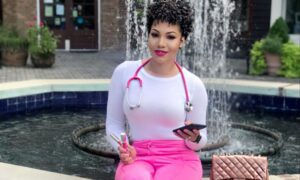By Candice Georgiadis – Follow Mar 7 · 8 min read
You learn to deal with death and suffering in a way that others do not. You learn that you cannot save everyone, which makes life so fragile. If it is time for someone to move on, all you can do is make their passing comfortable. The very fact that we devote our lives and time to help try to alleviate suffering and death is how some of us cope.
Asa part of my series about the women in wellness, I had the pleasure of interviewing Dr. Eva Beaulieu.
Dr. Eva Beaulieu is an Internist at Piedmont Henry Hospital outside of Atlanta, Georgia. She completed her residency at the Medical Center of Central Georgia after graduating from Ross University School of Medicine. Dr. Eva knew from a very young age that her purpose was to positively impact the lives of many. With English as her third language, Dr. Eva moved to the U.S. when she was 15 years old. Equipped with a thirst and undeterred passion, she pursued medicine.https://cdn.embedly.com/widgets/media.html?src=https%3A%2F%2Fwww.youtube.com%2Fembed%2FA-E7cHgZaz4%3Ffeature%3Doembed&display_name=YouTube&url=https%3A%2F%2Fwww.youtube.com%2Fwatch%3Fv%3DA-E7cHgZaz4&image=https%3A%2F%2Fi.ytimg.com%2Fvi%2FA-E7cHgZaz4%2Fhqdefault.jpg&key=a19fcc184b9711e1b4764040d3dc5c07&type=text%2Fhtml&schema=youtube
Thank you so much for joining us in this interview series! Our readers would love to “get to know you” better. Can you share your “backstory” with us?
Iwas born in Haiti and moved to the U.S. when I was almost 15 years old. Both of my parents were physicians with their own practices: my father was a Radiologist (he passed away in late August 2019) and my mother was a Dermatologist. She moved to the U.S. and had to go through taking her boards all over again, and completed her residency in Family Medicine, which was easier to get into than Dermatology. Growing up with both parents as doctors was a blessing. Seeing how hard they worked, the sacrifices they made, as well as the dedication and the impact they had on the lives of so many only strengthened my desire to be a physician. My parents did everything they could to give my brother and I the best life possible, and for that I will forever be grateful.
Can you share the most interesting story that happened to you since you started your career? What were the main lessons or takeaways from that story?
I began medical school as an optimistic and eager to learn student. I had one goal in mind: learn everything there is to know about the human body so that I can, one day, have the incredible opportunity to impact the lives of others in a positive way.
During my last year of medical school, while spending hours at the hospital each day learning and studying, I discovered a mole on my left foot. Because of what I had been taught during my curriculum, I was able to recognize the warning signs of an abnormal-looking skin lesion and followed my instincts to immediately visit a dermatologist who excised the lesion. The pathology report confirmed: Melanoma in situ, which meant that there were cancer cells in the top layer of my skin (the epidermis). Fortunately, the cells were all contained in one area and had not grown into deeper layers of the skin. I had caught it early and had an extensive three-hour surgery to my left foot with a skin graft.
Skin cancer is the most common malignancy in the United States, with an estimated 1.3 million cases each year. Melanoma is the most lethal skin cancer, but the diagnosis of thin melanoma is associated with a greater than 95% five-year survival rate. Who knew I would go to medical school to save my own life?
Can you share a story about the biggest mistake you made when you were first starting? Can you tell us what lesson you learned from that?
When I completed my residency and got my first job as an attending physician, I felt overwhelmed. No one really teaches you how to get by in the real world and having to figure things out on my own was a big deal. I had just gotten married, was in the process of buying my first house, and to top it all off, I was due to give birth within two months of starting my new job. This meant that I had to navigate being a wife, a Hospitalist, a new homeowner, and a new mom — all at the same time.
Within my first year as a Hospitalist, I decided to open my own practice, hoping that this would provide me with more flexibility, freedom, and time to spend with my son. Boy, was I wrong! This business venture was not at all what I had expected, as I ended up working more than ever. That’s when I realized I had made a big mistake by rushing into this new venture too quickly without giving myself the time and space I needed to turn my vision into a reality.
Through this experience, I learned that failure is not a bad thing. When we fail, we grow, mature, and achieve new understandings and perspectives on life. Failing has taught me my strengths and weaknesses, but most importantly, it taught me to always continue to move forward.
None of us can achieve success without some help along the way. Is there a particular person who you are grateful towards who helped get you to where you are? Can you share a story about that?
My parents had a huge impact on the person that I am today! They taught me to work hard and never give up. Through their example, I learned that hard work, effort, and education are the keys to success: they can change lives, open doors, and create opportunities that no one can take away from you.
Growing up with both parents as doctors was a learning process. Important-sounding words such as “biopsy”, “malignant”, “hemoptysis”, “popliteal fossa” would always be thrown around at home, and even at a very young age, I learned the meaning behind these words.
As a little girl, I can remember my father taking me to work with him. I could see how passionate he was about his work, and how he would go out of his way to help his patients. He was very dedicated and hard working. I will never be able to express my gratitude for my family. I would not be the person I am today without them and their positive life examples.
Ok perfect. Now let’s jump to our focus. When it comes to health and wellness, how is the work you are doing helping to make a bigger impact in the world?
The pandemic has shone a light on the long-standing health disparities within the African American community. This is largely due to social determinants of health that many Black people face, including the type of work we do, where we live and the quality of health care to which we have access. The death rate for African Americans is higher than Whites for heart disease, stroke, cancer, diabetes and more.
I want to change the culture of health and wellness by inspiring others to make healthier choices, no matter where they are on their individual wellness journey. I’ve also partnered with Clorox and Pine-Sol to educate consumers on why it’s important to disinfectant your home regularly as part of your overall health and wellness to help prevent the spread of viruses including SARS-CoV-2, the virus that causes COVID-19.
Can you share your top five “lifestyle tweaks” that you believe will help support people’s journey towards better wellbeing? Please give an example or story for each.
First: Bring a water bottle with you everywhere you go. Make sure you’re getting at least eight glasses of water per day. Water helps your kidneys, keeps your skin clear, maximizes your physical performance, maintains normal bowel functions as well as mood, memory, and brain performance. The bottom line: even mild dehydration can affect you mentally and physically.
Second: Find new ways to move daily. There are many types of physical activity including swimming, running, jogging, walking, and dancing to name a few. Increasing your activity can help combat obesity, hypertension, diabetes, high triglycerides, depression, and anxiety.
Third: Prevent the spread of germs. Staying healthy is a key part of wellbeing– especially during the pandemic — so it’s important to wear a mask, frequently wash your hands and continue to social distance. I also recommend using an EPA-approved disinfectant on high-touch surfaces in the home, such as doorknobs, light switches, or countertops.
Fourth: Tend to your mental health by taking regular breaks from the digital world. Taking screen breaks throughout your day will help you get more done with greater ease and enjoyment and will also lower stress on your body and mind, which will benefit your overall health.
Fifth: Get 7–8 hours of sleep every single night. Good sleep improves concentration, boosts your immune system, increases productivity/mood/memory, reduces stress/depression, and can strengthen your heart.
If you could start a movement that would bring the most amount of wellness to the most amount of people, what would that be?
I would start a self-care movement that teaches people that caring for yourself is not self-indulgence but self-preservation. Paying attention to how you feel and prioritizing your mental, physical and spiritual health are important to relieve the pressures of life, decrease anxiety/depression/burnout, maximize productivity, improve energy, increase happiness, decrease frustration/anger and ultimately reduce heart disease/stroke/cancer and more.
What are your “5 Things I Wish Someone Told Me Before I Started” and why?
- It is a long journey, one that is simultaneously exhausting and rewarding. As a Hospitalist, you don’t get to pick your work or vacation schedule. However, the ability to significantly improve the quality of life of your patients is a tremendously satisfying experience.
- The more you learn, the more you realize how much you still need to know. Contrary to what the public thinks, doctors don’t know everything about the human body. The body of medical knowledge is rapidly expanding, and for the rest of your career, you will still be learning about new medical discoveries and treatments.
- You will frequently question whether you made the right decision. Being a physician can be physically and emotionally exhausting. It’s a career nothing short of demanding, a job requiring constant studying and a chaotic schedule at times. But the rewards of this lifelong journey are plentiful. Every day is a gift to have the opportunity to care for patients in their most vulnerable times.
- You learn to deal with death and suffering in a way that others do not. You learn that you cannot save everyone, which makes life so fragile. If it is time for someone to move on, all you can do is make their passing comfortable. The very fact that we devote our lives and time to help try to alleviate suffering and death is how some of us cope.
- Put yourself first. You are the most important person in your life. You must take some time to unwind, take care of yourself and prioritize self-care to avoid burnout.
Sustainability, veganism, mental health, and environmental changes are big topics at the moment. Which one of these causes is dearest to you, and why?
The pandemic has taken away almost everything that keeps us sane: human connections, community, fitness, physical contact, friendships, etc. At the same time, it has also shone a light on our broken mental health care system. I’ve seen how mental illness affects others from all backgrounds and situations. Mental health is important at every stage of our lives because it can affect physical health and how we cope with life. Mental health difficulties are nothing to be ashamed of and should be discussed openly without fear of judgement.




